传统风俗英语
本站独坐楼窗间对网友提出的“传统风俗英语”问题,进行了下面的分析供大家学习。
文章目录列表:
传统风俗英语
传统习俗的英文是traditional custom。
传统习俗是指人们在社会生活中逐渐形成的,从历史沿袭而巩固下来的,具有稳定的社会风俗和行为习俗,并且已同民族情绪和社会心理密切结合,成为人们自觉或不自觉的行为准则。
“习俗”就是风俗习惯,个人或集体的传统、传承的风尚、礼节、习性。形成风俗的事件都挺大,挺普遍,而习俗可大可小,可普遍也可特殊细小。
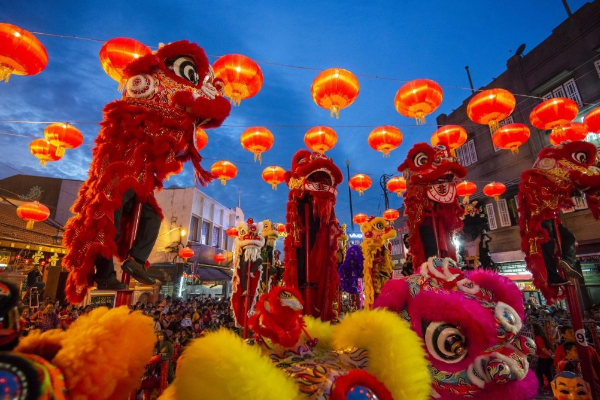
双语例句
1、你可以了解一些中国的传统习俗。
You'll learn something about the traditional Chinese practice。
2、中国传统习俗及仪式他们以传统方式出席仪式。
Chinese customary rites and ceremonies They worship in the traditional manner。
3、是的,这可能是中国人的传统习俗。
David:Yeah,that's a part of Chinese culture。
4、按照传统习俗,他们的房子朝东面而建。
According to custom,their house was built facing the east。
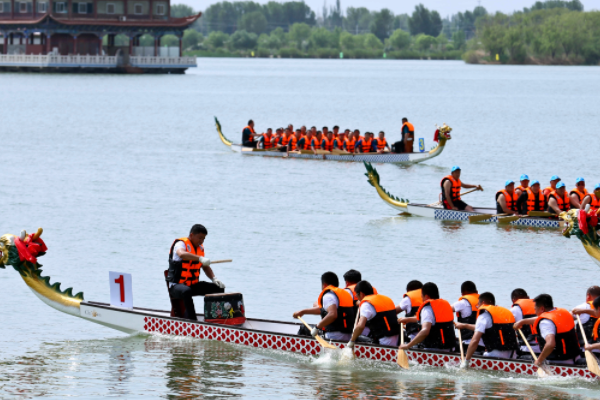
5、其传统习俗保留着纯朴的信仰观念与远古的仪式。
The festival traditional customs preserve pure and simple belief and witchery ceremony。
春节的由来英语简短
春节的由来简短的英文版如下:
英文介绍:The Spring Festival falls on the 1st day of the 1st lunar month,often one month later than the Gregorian calendar.It originated in the Shang Dynasty (c.1600 BC-c.1100 BC) from the peoples sacrifice to gods and ancestors at the end of an old year and the beginning of a new one.
翻译:春节是农历正月初一,通常比公历晚一个月。它起源于商朝(约公元前1600年至公元前1100年),源于人们在元旦末和新的一年初祭祀神和祖先。
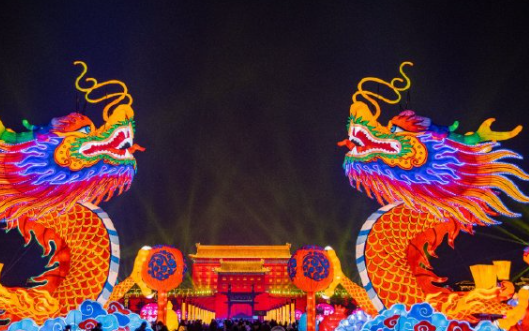
春节的历史
春节历史悠久,由上古时代岁首祈岁祭祀演变而来。万物本乎天、人本乎祖,祈岁祭祀、敬天法祖,报本反始也。春节的起源蕴含着深邃的文化内涵,在传承发展中承载了丰厚的历史文化底蕴。在春节期间,全国各地均有举行各种庆贺新春活动,带有浓郁的各地地方特色。
在早期观象授时时代,依据斗转星移定岁时,“斗柄回寅”为岁首。“斗柄回寅”大地回春,终而复始,万象更新,新的轮回由此开启。在传统的农耕社会,立春岁首具有重要的意义,衍生了大量与之相关的岁首节俗文化。
端午节用英语怎么说
民俗与节日英语
中国传统节日英文介绍带翻译如下:
1、春节(农历一月一日) Spring Festival;Chinese New Year's Day.
由来:
Primitive beliefs and sacrificial culture are important factors in the formation of New Year's Day.
原始信仰和祭祀文化是春节形成的重要因素。
习俗:
such as Lunar New Year's dinner, keeping the age, New Year's money, temple fairs, flower lanterns and other customs.
如团年饭、守岁、压岁钱、庙会、赏花灯等习俗。
2、元宵节(农历一月十五日) Lantern Festival(龙灯节直译)。
由来:
The custom of burning lamps on the fifteenth day of the first lunar month is related to the spread of Buddhism to the east.
正月十五燃灯的习俗与佛教东传有关。
习俗:
Lantern Festival mainly includes a series of traditional folk activities,
such as watching lanterns, eating dumplings, guessing lantern riddles and setting off fireworks.
元宵节主要有赏花灯、吃汤圆、猜灯谜、放烟花等一系列传统民俗活动。
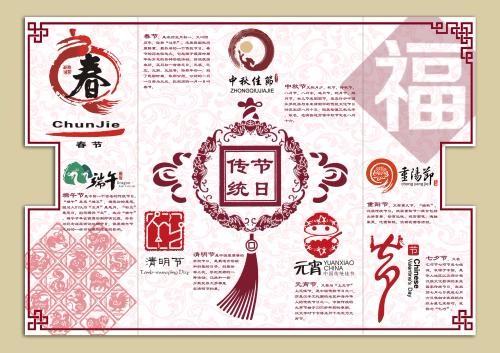
3、清明节(公历4月5日前后,农历二月后半月至三月上半月间) Tomb-Sweeping Day.
由来:
The Qingming Festival originated from the Spring Festival and the Spring and Autumn Festival in ancient times.
清明节源于上古时代的春祭,春秋二祭,古已有之。
习俗:
Tomb-sweeping, ancestor-sacrificing and outing are common basic etiquette and custom themes.
扫墓祭祖、踏青郊游是共同基本礼俗主题。
4、端午节(农历五月初五) Dragon Boat Festival(龙舟节直译)。
由来:
Dragon Boat Festival, with a long history, evolved from the dragon totem worship held in Baiyue in ancient times.
端午节,历史悠久,由上古时代百越举行龙图腾祭祀演变而来。
习俗:
The Dragon Boat picking and rice dumplings are the two main themes of the Dragon Boat Festival.
扒龙舟与食粽子是端午节的两大礼俗主题。
5、中秋节(农历八月十五) Mid-Autumn (Moon)Festival.
由来:
The Mid-Autumn Festival originated from the worship of celestial phenomena,
and evolved from the worship of the moon on the autumn evening in ancient times.
中秋节源自天象崇拜,由上古时代秋夕祭月演变而来。
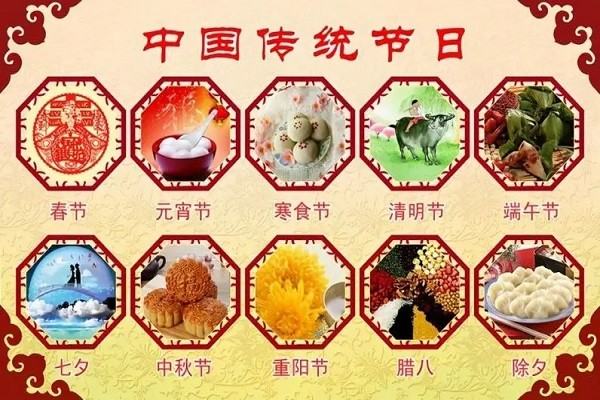
习俗:
offering sacrifices to the moon, enjoying the moon, eating moon cakes,
playing with lanterns, appreciating osmanthus flowers and drinking osmanthus wine.
中秋节自古便有祭月、赏月、吃月饼、玩花灯、赏桂花、饮桂花酒等民俗。

